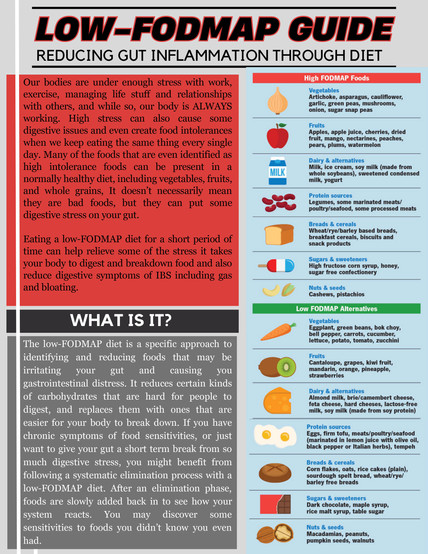Low-FODMAP Foods: Reducing gut inflammation through diet
- Katie Gavin

- May 21, 2023
- 2 min read
Our bodies are under enough stress with work, exercise, managing life stuff and relationships
with others, and while so, our body is ALWAYS working. High stress can also cause some
digestive issues and even create food intolerances when we keep eating the same thing every single day. Many of the foods that are even identified as high intolerance foods can be present in a normally healthy diet, including vegetables, fruits, and whole grains, It doesn’t necessarily mean they are bad foods, but they can put some digestive stress on your gut. Eating a low-FODMAP diet for a short period of time can help relieve some of the stress it takes your body to digest and breakdown food and also reduce digestive symptoms of IBS including gas and bloating.
What is it?
The low-FODMAP diet is a specific approach to identifying and reducing foods that may be
irritating your gut and causing you gastrointestinal distress. It reduces certain kinds of
carbohydrates that are hard for people to digest, and replaces them with ones that are easier for your body to break down. If you have chronic symptoms of food sensitivities, or just want to give your gut a short term break from so much digestive stress, you might benefit from following a systematic elimination process with a low-FODMAP diet. After an elimination phase, foods are slowly added back in to see how your system reacts. You may discover some sensitivities to foods you didn’t know you even had.
How long is the elimination?
It is recommended that the elimination phase (Low-FODMAP foods only) lasts at least two
weeks and no more than six weeks. This gives the time for some bad bacteria/overgrowth in the gut to starve. When re-introducing foods, the time can vary depending on the person, but the average time is 8 weeks. Here, you will stay on the low-fodmap diet while reintroducing high- FODMAP foods one at a time, spending a few days testing each food and increasing quantities and seeing how your body reacts. Once you find out what works for you and what doesn’t, you can then be sure which foods you need to avoid and which ones have the green light.
Benefits:
-Helps identify dietary triggers
-less gas
-less bloating
-less diarrhea
-less constipation
-less stomach pain
-weight loss (due to loss of inflammation)
Although the diet is strict in the short term, it is most definitely NOT a lifestyle diet. The intent is to isolate foods that may not be the best for your gut microbiome and help you digest other
foods better.
A full list of low and high FODMAP foods can be found at https://www.ibsdiets.org/fodmap-
diet/fodmap-food-list/








Comments